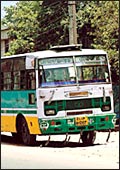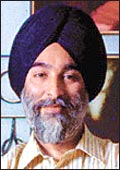 |
| Trendsetter: Infosys' Murthy has no
plans to retire now |
N.R. Narayana
Murthy, chairman and chief mentor of Infosys Technologies, will
turn 60 on August 21 this year; that day, he will assume a new
role-of Non-Executive Chairman of the company he founded 25 years
ago. Murthy is stepping back, not to retire, but to indulge in
a passion-following in the footsteps of his schoolmaster father-and
teach Infoscians at the company's leadership institute in Mysore.
He has groomed a team of successors well in advance, so his moving
on is not expected to change the way the company operates. But,
Murthy-an unsentimental man who is driven more by logic and numbers
than by emotion-admitted to this correspondent recently that the
decision wasn't at all easy. He is, after all, an icon in a nation
starved of them. His-and indeed, all the Infosys co-founders'-appeal
lies in the fact that a bunch of middle class, next-door-neighbour-type
guys with nothing except education, enterprise and ethics going
for them achieved so much in so little time. Infosys did not invent
terms like corporate governance, transparency and playing by the
book, but Murthy's personal example has ensured that the company
has now become synonymous with these values. "When in doubt,
disclose," is a famous Murthy-ism; "a clear conscience
is the softest pillow" is another.
If all this has given you the impression that Murthy
is heading towards semi-retirement, then perish the thought. On
the day this correspondent met him for this report, there was
a bevy of architects and suppliers waiting to meet him to discuss
Infosys' plans to expand and build campuses across the country.
Though he may be (symbolically) moving from his corner room to
another ("to make a clean break and to start with a new slate,"
he says) his presence will continue to loom large. "I will
always be there to help and guide the company whenever it needs
me," he says.
-Venkatesha Babu
NUMBERS
OF NOTE
$3,130 (Rs 1,47,110):
The amount NRI steel tycoon L.N. Mittal earns every minute on
his $23.5-billion (Rs 1,10,450 crore) fortune
2,025:
The number of new employees that joined Infosys on June 26
$357.3 million
(Rs 1,679.3 crore): The amount Microsoft has been fined by
the European Commission for failing to comply with its 2004 anti-trust
ruling
Over 10,000:
The number of company secretary posts now lying vacant, according
to the Institute of Company Secretaries of India (ICSI), which
says registration of students has fallen by about 15 per cent
over the past two years
262: The
number of times the pay of a US CEO exceeded that of a worker
in 2005, according to the Economic Policy Institute, a Washington-based
think tank. It means, US CEOs earned more in one workday than
a worker earned in one year (260 working days)
$132 million
(Rs 620.4 crore): The record pickings of Pirates of the Caribbean:
Dead Man's Chest in the first three days after its release
4.80 million:
The number of new telecom users added in June (4.78 million
new mobile connections and 0.2 million new fixed lines), taking
India's telecom subscriber base to 153.37 million
$2.6 trillion
(Rs 1,19,60,000 crore): Total amount of money likely to be
spent by airlines worldwide on buying new commercial jets over
the next 20 years, according to Boeing
40 million
tonnes: The amount of steel India produces a year. By 2010,
demand is likely to be 65 MT. Mittal Steel alone produces 75 million
tonnes, and the Arcelor-Mittal combine has a capacity of 121.7
million tonnes
2.4 metres
by 1.4 metres: The size of Matsushita
Electric's proposed plasma TV, the world's largest, which it plans
to launch early next year
13:
Number of football World Cup finals (out of a total of 18
so far) decided after 90 minutes. Three finals were decided after
extra time and two after penalty shootouts
NOTED
 ORDERED:
Environment friendly CNG buses, by airlines operating from
Delhi. They have placed orders with Tata Motors, Ashok Leyland,
and others to complete the switchover. ORDERED:
Environment friendly CNG buses, by airlines operating from
Delhi. They have placed orders with Tata Motors, Ashok Leyland,
and others to complete the switchover.
APPROVED: The
setting up of the Sixth Pay commission, by the Cabinet. Its award,
which will affect 55 lakh central government employees, will cost
the exchequer an additional Rs 20,000 crore annually in pay and
allowances. The three-member commission will give its report in
18 months.
LISTED: The
Indian middle class, by Fortune, as being among the world's Top
50 Who Matter list, ahead of US Federal Reserve Chairman Ben Bernanke
(20th) and Microsoft Chairman Bill Gates (21st). "The emerging
global middle class of China, India, Russia, Brazil and elsewhere"
has been ranked seventh.
PULLED UP: By
the Insurance Regulatory and Development Authority, public sector
insurance companies for trying to deny health insurance benefits
to elderly people. Earlier, Oriential Insurance Company tweaked
procedures making it difficult for people above 50 from buying
or renewing mediclaim policies.
RECORDED: By
Delhi, a per capita income of Rs 53,976, double the national average,
according to Delhi government's estimates of state domestic product
(SDP) 2004-05. Delhi's per capita income figure is the highest
among all states in India. The national per capita income at current
prices is Rs 23,241.
 FILED:
By Nimmi Singh, mother of Ranbaxy honchos Malvinder and Shivinder
Singh, a criminal complaint against Max chairman Analjit Singh
and others, for allegedly intimidating and assaulting her and
her daughter-in-law. Analjit has also filed a defamation case
against Nimmi for allegedly maligning him. FILED:
By Nimmi Singh, mother of Ranbaxy honchos Malvinder and Shivinder
Singh, a criminal complaint against Max chairman Analjit Singh
and others, for allegedly intimidating and assaulting her and
her daughter-in-law. Analjit has also filed a defamation case
against Nimmi for allegedly maligning him.
TRANSFERRED:
P.K. Kedia, Director, Investigations, Income Tax Department. He
was probing the payment of Rs 300 crore as bribes by the liquor
lobby to several leading politicians and bureaucrats. All other
members of the investigation team have also been transferred out.
NEW
PETROL-LPG WAGON R LAUNCHED
Maruti
has launched a new-look Wagon R, called Wagon R Duo that runs
on both petrol and LPG. You can switch from one fuel to the other
with the flick of a switch. The car has a 22 litre gas kit, which
is being procured from Poland and the US, and a conventional 35
litre petrol tank. The obvious draw: "the running costs of
an LPG car are 33 per cent lower than one which runs on petrol,"
says MUL MD Jagdish Khattar. The Duo costs between Rs 3.4 lakh
and Rs 3.6 lakh. Three regular petrol-only versions are also available
and cost Rs 3.23 lakh to Rs 3.72 lakh.
-Amit Mukherjee
AIDS
CAN SLOW DOWN GROWTH
| THE AIDS REPORT |
»
GDP growth could decline 0.86 per cent over the
next 10-15 years
» In absolute
terms, that's a loss of Rs 11,09,793 crore
» Government
savings could fall 67 bps
» Household
savings may dip 115 bps
» Women
and femal children to suffer most |
Finally, there
are numbers on the economic impact of HIV/AIDS on the Indian economy
as well as the affected households. A recent set of studies, by
National Council of Applied Economic Research (NCAER), map out
some of the crucial impact of the epidemic. India's economic growth
could decline by 0.86 per cent over the next 10-15 years if the
growth of the epidemic remains unchecked. In absolute terms, that
will result in Rs 11,09,793 crore being shaved off the gross domestic
product (GDP) in 2015-16 (at 2002-03 prices), according to model
projections. The rationale: increased health spending by both
households and the government leads to a fall in savings, which
crowds out investment and results in a slowdown in growth. Government
savings as a percentage of GDP could fall 67 basis points and
household savings by 115 basis points.
At the household level, the total income
could fall by 9.24 per cent due to lost earnings from illness
and death. The worst affected, as usual, are the women and female
children as there is often gender discrimination in treatment
and care. Children from the affected families are more likely
to have lower enrolment and higher drop-out rates, the study notes.
And since education is the first line of defence against the disease,
doors for prevention already start closing on them from childhood
itself.
-Shalini S. Dagar
|






 ORDERED:
ORDERED:
 FILED:
FILED: